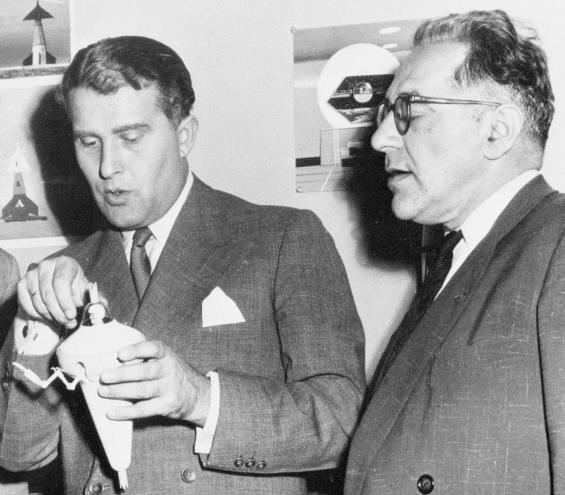
Archive.org has a wonderful 90 minute English language conversation between two famous German rocket scientists!
Check it out |MP3|
A historic conversation between German rocket scientists Wernher von Braun and Willy Ley. Highlights include the development of the German rocket programs during WWII, and the space program in the 1950’s. Recorded June 9th and 23rd, 1959, in New York City and Redstone Arsenal, Huntstville, Alabama.
Indeed hearing Wernher von Braun and Willy Ley talk is very cool.
Ley and von Braun talk about:
old school days in Germany, Hermann Oberth‘s influential book Die Rakete zu den Planetenräumen (“By Rocket Into Interplanetary Space“), Fritz Lang movie Woman In The Moon, rocketry and rockets from the V-2 to the Saturn rocket family, geosynchronous satellites, the Mercury project, space stations, weather satellites, the Van Allen radiation belt, the role of humans in space, sending men around the Moon, the logistics of photographing and visiting Venus and Mars, space probes, a “semi-philosophical question about Man’s rights in space”, theological objections (and blessings), the compatibility between religion and science, Blaise Pascal, extraterrestrial life, vegetation on Mars, smart aliens, Arthur C. Clarke’s first law.
As you can see it is very historic!

I won’t say much more about the fascinating Wernher von Braun as I recently posted a biographical radio dramatization about him. But I will point out that Willy Ley is pretty damn amazing. Ley was an avid reader of Science Fiction, contributed science articles to Astounding Stories and Galaxy Magazine and was a member of the Trap Door Spiders – there is a wonderful Wikipedia entry about him to explore HERE.
Posted by Jesse Willis


 1960:
1960: 1961:
1961:
